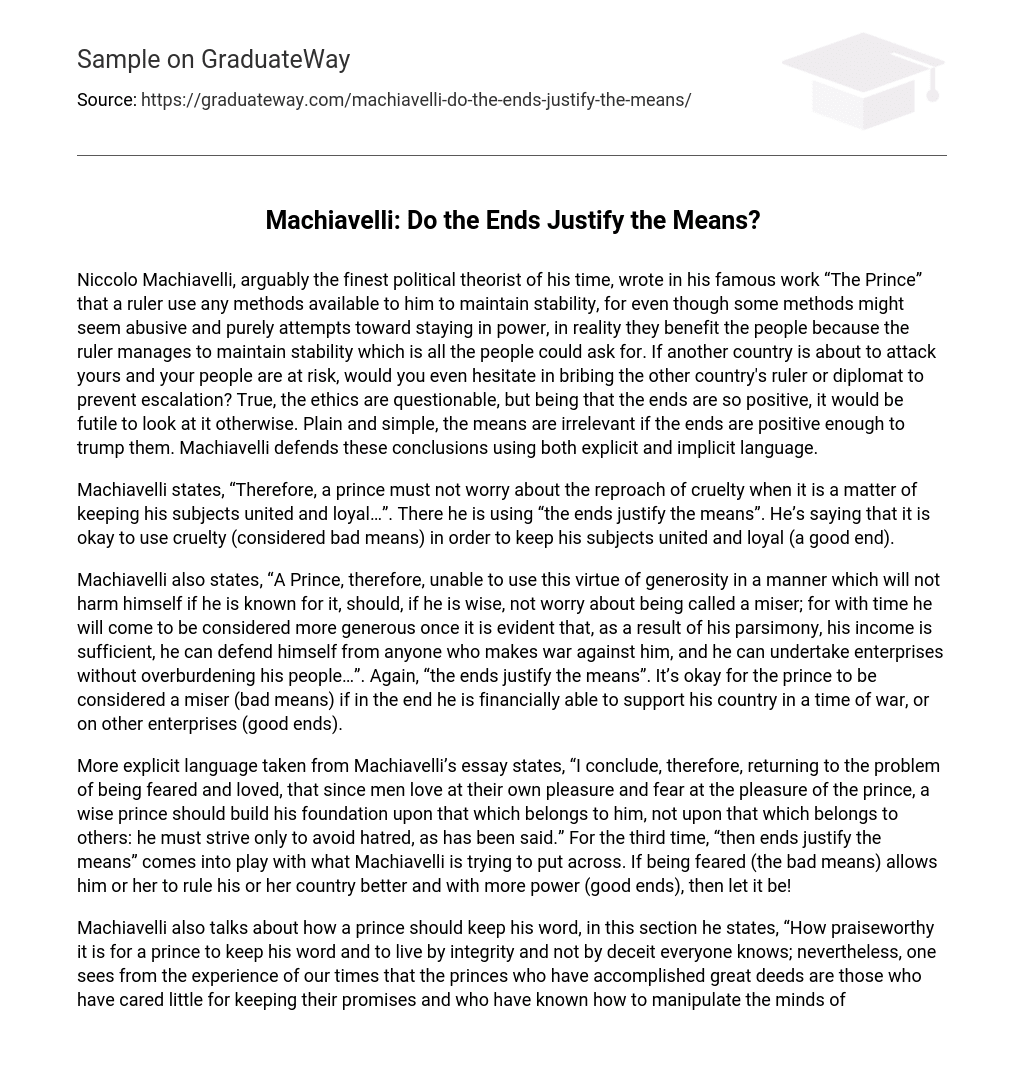In “The Prince,” Niccolo Machiavelli, a highly respected political theorist, argues that rulers should use any available methods to maintain stability. Although some methods may appear abusive and focused solely on preserving power, they ultimately benefit the people by ensuring stability – their primary desire. For instance, if your country faces a potential attack from another nation and your people are at risk, would you hesitate to bribe the ruler or diplomat of that country to prevent further escalation? While the ethics of such actions may be questioned, it is pointless to perceive them differently when the ultimate outcome is so positive. Essentially, when the ends are significant enough, the means become insignificant. Machiavelli supports these conclusions through both explicit and implicit language.
According to Machiavelli, the unity and loyalty of a prince’s subjects should take precedence over concerns of being criticized for cruelty. This concept can be condensed into “the ends justify the means,” permitting the use of cruel actions (often viewed negatively) to attain a favorable result.
Machiavelli argues that if a Prince cannot use generosity without harming himself due to his reputation, he should not worry about being labeled as a miser. Over time, it will become clear that his income is enough, he can protect himself from enemies, and he can pursue ventures without burdening his subjects. Essentially, “the ends justify the means.” Thus, it is acceptable for the prince to be seen as a miser if it ultimately allows him to financially support his country during times of war or other undertakings.
According to Machiavelli, a prudent ruler should establish their power on what is rightfully theirs instead of relying on others. He underscores the significance of avoiding animosity and highlights the idea that “the ends justify the means.” If ruling through fear enables the prince to govern more efficiently and acquire greater authority, then it is deemed acceptable.
According to Machiavelli, the significance of a prince’s word and integrity is discussed. The admiration for a prince who keeps their promises and tells the truth is acknowledged. However, Machiavelli observes that in our current time, those who achieve great things often manipulate others and break their commitments. Ultimately, these manipulative tactics surpass the success of those who rely on honesty. Machiavelli concludes that while it would be ideal for a prince to keep their word, it is not always effective in reality. Therefore, if breaking promises serves the best interest of their country, it is acceptable according to the principle of “the ends justify the means.”
Machiavelli’s main argument is that a prince should not necessarily possess all the mentioned qualities, but it is crucial for him to appear as if he does. He explains that actually possessing and practicing these qualities at all times can be harmful, while simply appearing to have them can be advantageous. For example, a prince should genuinely possess and demonstrate qualities such as mercy, faithfulness, humanity, forthrightness, and religiosity. However, he should also have a mindset that allows him to adapt and change when necessary.
According to Machiavelli, a prince, particularly a new one, cannot always strictly adhere to the virtues valued by society. In order to maintain control of the state, there may be situations where he must act contrary to his promises or go against principles like charity and religiousness. Thus, he must be ready to adjust his actions based on changing circumstances.
In essence, a prince should strive to embody good qualities for as long as possible but also know how to embrace evil if necessity dictates so. Ultimately, the key is for the prince to project an image of virtuous qualities publicly (using questionable means), while privately possessing the true qualities of a ruler with good intentions (beneficial ends). Therefore, a prince requires adaptability in different situations.
To sum up, I believe that what truly matters is achieving positive results for the majority of individuals, regardless of the ethical nature of the methods used.





